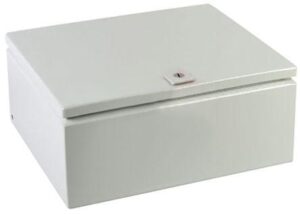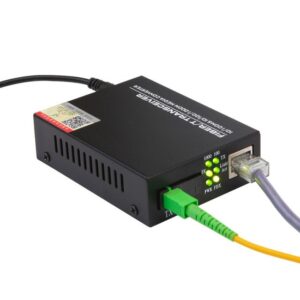Introduction
Every electrical installation, whether residential, commercial, or industrial, relies on structured connections that ensure safety and reliability. Among the essential components that make this possible, the electrical junction box stands out as a vital element. It acts as a protective enclosure where electrical wires and cables are connected, joined, or split. The junction box ensures that all wiring connections are safely contained, preventing accidental contact, short circuits, and potential fire hazards.
In modern electrical and electronic systems, where complex wiring networks are common, junction boxes play a critical role in maintaining circuit organization and structural integrity. They serve as the backbone for wiring layouts, enabling engineers and electricians to manage cables efficiently while ensuring compliance with safety regulations.
What Is an Electrical Junction Box?
An electrical junction box is a protective housing that encloses electrical wire connections, safeguarding them from damage and exposure. It is typically made of metal or non-metallic materials such as steel, aluminum, or PVC, depending on the application and environment. The primary purpose of a junction box is to provide a secure and accessible location for joining wires or connecting electrical circuits.
The box can accommodate various components, including connectors, terminals, and conductors. Once the connections are made inside, the box is covered with a lid or plate to ensure complete protection. The design of the junction box also allows easy access for inspection, maintenance, and future modifications without disturbing the main wiring system.
Importance of Using an Electrical Junction Box
The importance of an electrical junction box lies in its role in safety, organization, and long-term performance. Without these enclosures, exposed wire connections would be susceptible to physical damage, corrosion, and electrical faults. By housing connections in a junction box, the risk of electric shock, fires, and circuit failure is significantly reduced.
Junction boxes also help maintain the aesthetics and functionality of an installation. They conceal wiring connections, ensuring a clean and professional look in homes, offices, or factories. Additionally, they simplify troubleshooting and system expansion by providing a dedicated space for accessing connections when needed.
From an engineering standpoint, junction boxes contribute to maintaining consistent current flow and reducing voltage drops across the system. They are essential for distributing power in lighting, outlets, control systems, and industrial automation setups.
Types of Electrical Junction Boxes
There are several types of junction boxes, each designed for specific applications and environments. The most common types include:
Metal Junction Boxes
Metal junction boxes are typically made from galvanized steel or aluminum. They offer superior durability, heat resistance, and grounding capabilities. These boxes are widely used in commercial and industrial applications where wiring may be exposed to mechanical stress or high temperatures. Metal enclosures are also suitable for grounding circuits, enhancing electrical safety.
Plastic (PVC) Junction Boxes
PVC junction boxes are lightweight, corrosion-resistant, and easy to install. They are commonly used in residential and outdoor applications where moisture resistance is critical. Their non-conductive nature ensures protection against accidental electric shocks. Plastic boxes are also suitable for installations involving electronic devices, as they minimize electromagnetic interference.
Weatherproof Junction Boxes
Designed for outdoor environments, weatherproof junction boxes feature sealed gaskets and watertight covers to prevent water and dust ingress. They are ideal for garden lighting, external outlets, and industrial setups exposed to rain, humidity, or dust. Their IP-rated enclosures ensure long-lasting reliability even in harsh weather conditions.
Underground Junction Boxes
Used in outdoor electrical and telecommunication systems, these boxes are buried underground to protect wire joints and connections. They are built from high-strength materials capable of withstanding soil pressure, moisture, and temperature variations.
Explosion-Proof Junction Boxes
In hazardous environments such as chemical plants, refineries, or mining sites, explosion-proof junction boxes are used to contain potential sparks or heat within the enclosure, preventing ignition of surrounding flammable gases or dust. These boxes comply with strict industrial safety standards and certifications.
Applications in Electrical and Electronic Systems
Electrical junction boxes are used across various sectors due to their versatility and protective function. In residential buildings, they are installed behind walls or ceilings to manage wiring for lighting, outlets, and switches. In commercial spaces, they organize and distribute wiring for communication systems, HVAC controls, and power distribution networks.
In industrial environments, junction boxes are used to manage connections in motor control centers, automation systems, and process control equipment. They often contain wiring for sensors, relays, programmable logic controllers (PLCs), and other electronic components. By keeping these connections secure, the junction box ensures that electrical and electronic systems operate smoothly with minimal interference or downtime.
For renewable energy applications such as solar and wind power, junction boxes are equally essential. In solar panels, for example, they serve as the point where multiple photovoltaic (PV) cells connect, protecting sensitive circuits from moisture and dust while allowing safe current distribution.
Key Benefits of Electrical Junction Boxes
The benefits of using an electrical junction box extend beyond simple protection. They improve the overall safety, functionality, and lifespan of an electrical system. Some notable advantages include:
-
Protection against electric shock and fire hazards
-
Organized and accessible wiring system
-
Enhanced durability of wire connections
-
Simplified maintenance and troubleshooting
-
Compliance with electrical standards and building codes
-
Reduced mechanical strain on wires and connectors
By isolating wire joints from the external environment, junction boxes reduce the risk of corrosion, insulation degradation, and short circuits—common issues that can lead to costly repairs or downtime in electronic systems.
Material and Design Considerations
The choice of junction box material depends on factors such as voltage level, installation environment, and exposure conditions. Metal boxes are preferred for heavy-duty industrial applications, while plastic boxes are ideal for domestic and damp environments.
Design aspects such as size, mounting type, and number of knockouts (openings for cables) also play a significant role. Boxes with more knockouts provide flexibility in routing wires, while deeper boxes can accommodate additional connectors or wiring. Additionally, grounding provisions and labeling features in modern junction boxes help maintain safety and easy identification during maintenance.
Role in Safety and Compliance
Electrical safety regulations worldwide emphasize the use of junction boxes to meet building and electrical codes. These standards require that all wire splices and connections be enclosed within protective housings to prevent accidental contact. Using an appropriate junction box ensures compliance with national and international standards such as IEC, BS, and NEC codes.
In electronic systems, where precision and stability are critical, junction boxes also help reduce electromagnetic interference and maintain circuit integrity. Their enclosures shield sensitive electronic components from external signals and environmental stress.
Conclusion
The electrical junction box is a fundamental yet powerful component in electrical and electronic systems. It ensures safety, organization, and longevity by protecting wire connections from environmental and mechanical damage. Whether used in residential wiring, industrial automation, or renewable energy systems, it remains indispensable to the integrity of electrical networks.
As technology continues to advance, modern junction boxes are evolving with better materials, modular designs, and improved safety features to meet the demands of next-generation power and control systems. For professionals seeking high-quality junction boxes and accessories, Enrgtech provides certified products designed for performance, durability, and compliance—ensuring safer, smarter, and more efficient electrical installations.








